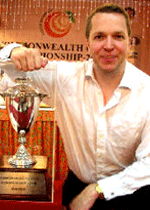Short Nigel David (01.06.1965)
 English Grandmaster (1984). FIDE Vice-President (2018-), British Champion, Challenger for the title of World Champion in 1993. Short has written chess columns and book reviews for The Sunday Times, The Daily Telegraph, the Daily Mail, The Spectator, The Sunday Telegraph and New in Chess.
English Grandmaster (1984). FIDE Vice-President (2018-), British Champion, Challenger for the title of World Champion in 1993. Short has written chess columns and book reviews for The Sunday Times, The Daily Telegraph, the Daily Mail, The Spectator, The Sunday Telegraph and New in Chess.
Nigel performed his phenomenal talent in chess when at the age of 12, he played in the British Championship for adults and beat the national GM Penrose. At 15, he finished second behind Garry Kasparov at the World U20. One year later Nigel decided to leave school and to totally devote himself to chess. Success came to him very soon. Shortly afterward, became an international player and won the Tournament of Baku in 1983. Next year he qualified at the Zonal Tournament and won in Esberg. The real start came in 1985 after he won the British Championship, then crushing the American Champion Lev Alburt 7-1. He performed brilliantly in Wijk aan Zee in 1986, 1987 and Reykjavik in 1987; he finished ahead of Mikhail Tal, Jan Timman, Viktor Korchnoi and Lajos Portisch. The same year he won also the Interzonal of Subotica.
He won Hastings in 1988 and 1989, Amsterdam in front of Anatoly Karpov. During the Chess Olympiad of Thessaloniki 1988, he said in an interview: “My time has come. The next World Championship Cycle is mine. I feel it.” He was right, but it did not come so early. In the 1988 cycle, he won the Hungarian Gyula Sax, then lost to his countryman Jon Speelman, but in the next attempt to gain the Word Champion throne, he beat Boris Gelfand with a score 5-3, Anatoly Karpov 6-4, and Jan Timman 7½-5½, making Short a player of world class.
The explanation is his great combinational gift. He persistently strives for initiative and attack. His strength and tactical wealth enable him to find solutions out of difficult situations.
In 1993, Short and the World Champion Garry Kasparov quit FIDE to organize their own match played under the auspices of a new professional organization of both players just created for the circumstance (PCA). Of course, Kasparov was too strong and the score between them before the match gave no doubt. Kasparov won ten games, and Short only one. Two months later, Kasparov celebrated his victory (12½-7½) in London. Came then a long list of success: in 1996, he won in Parnu and Groningen then lost to Michael Adams in the 1997 FIDE World Championship semi-finals. In 1998 he won Tallinn, Dhaka, Isle of Man and another British championship title. He started well in 2000 by winning strong Pamplona, and then he shared first place in Beijing, later he lost a rapid match against the Women’s Champion Xie Jun. In 2003, he won Gibraltar, Budapest, and Taoyuan In 2006, he won Politiken Copenhagen, the European Union Chess Championship and the Commonwealth Championship; in 2007, the President Cup at Baku and in 2008, he succeeded at Barza, became once more the Commonwealth Champion and lost an exhibition match (Rapid) to Sergey Karjakin 2½-7½.
In 2008 he won Bosnia, Bakou, Nagpur in India with another Commonwealth title then Malmö in 2009, Pattaya and Ekurhuleni in 2011. The following years he triumphed in Bangkok Chess Club Open (2011, 2012, 2015, 2017), 7th Edmonton International (2012), Bunratty (2012, 2016, 2017), RA Club Ottawa (2012), Pühajärve Rapid Chess Tournament (2012), Spicenet Tanzania Open (2013), Canadian Open Championship (2013), PokerStars Isle of Man (2014), Zaw Win Lay Memorial Yangon (2014), the South African Open (2015) the 1st Stars Cup in Anzali (2016) and the British Knockout Championship (2016).
Short was voted BCF’s Player of the Year in 1986, 1988, 1991 and 1992, and in 2006 for a year.
Peak rating: 2712 in 2004



